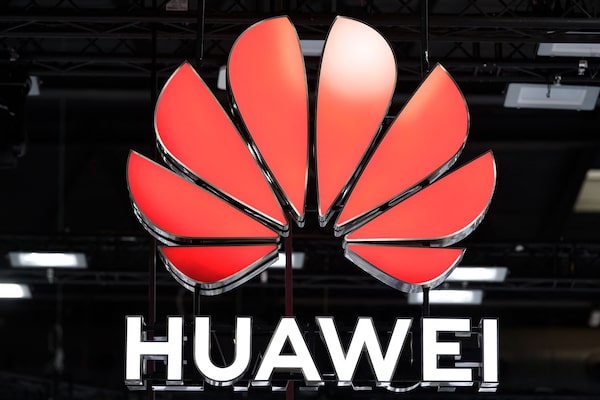
Canada’s decision about Huawei is not just about market access: it is equally about China’s strategic ambitions.JOSEP LAGO/AFP/Getty Images
J. Michael Cole is a Taipei-based senior fellow with the Macdonald-Laurier Institute and a former intelligence officer with the Canadian Security Intelligence Service.
Ottawa will soon announce whether it will give Huawei Technologies, the major Chinese technology company with suspected ties to the country’s military, access to Canada’s next-generation 5G wireless network. The decision will have a serious effect on Canada’s standing within the Five Eyes intelligence-sharing alliance, whose three of four other members have banned Huawei from their 5G infrastructure over safety concerns.
Democratic countries have been reluctant to give Huawei a role in their next-generation communications networks because under China’s National Intelligence Law, all Chinese organizations and citizens are obligated to “support, assist, and co-operate with state intelligence work” if asked to do so by the authorities. In other words, Huawei is nothing like a private firm as it is legally understood in the West – rather, the government’s law means that at any time, the company can be called upon to be an extension of the Chinese Communist Party’s global strategy and the state intelligence apparatus. The CCP’s vision is to shape the world in a way that is more amenable to its authoritarian ideology, and it will use every tool at its disposal.
Huawei’s efforts, then, cannot be seen as simply business as usual – the company has immense strategic value to China, and can provide its government unique access to countries worldwide.
The potential threat Huawei represents to the integrity of Canada’s national communications infrastructure has been discussed at length, and despite denials by Cong Peiwu, China’s ambassador to Canada, our national security apparatus has taken these concerns seriously. However, even if it could somehow be proven beyond a doubt that none of Huawei’s systems include backdoors that can be exploited to covertly access telecom networks, giving the Chinese tech giant a role in our nation’s infrastructure would still pose a threat.
The reason is this: giving Huawei a foothold into our telecom networks would inevitably increase the CCP’s ability to exert influence on our foreign policy. Beijing would likely try to exploit our dependence on Huawei products – for foundational 5G technology and future iterations of our telecom infrastructure – to condition our policymakers, largely through a mechanism that the CCP has used time and time again to coerce, punish and reward countries worldwide: denial.
Once a country becomes dependent on a specific firm for something as critical as national telecom architecture, it will be extremely difficult – and extremely costly – to reverse course and replace the key components of that infrastructure with another firm’s technologies. The incentive would be to maintain that relationship with the initial firm, and to avoid anything, including policy decisions, that could potentially compromise it. Dependence on Huawei systems, therefore, would expose Canada to potential blackmail and the hijacking of our sovereignty – something that Beijing has already attempted through the co-opting of business elites and sectoral economic retaliation.
It is especially important for Canada to avoid such a pitfall given the direction that China has taken under the current regime. Under President Xi Jinping, China has overturned many of the policies that, under his predecessors, had led to optimism about the potential liberalization of China, including respect for human rights and abidance by global trade norms. Mr. Xi’s China is more repressive, intrusive and assertive than it has been in decades, while under his guidance the CCP has grown much more hostile toward global institutions and democracy. With Mr. Xi tightening his grip on the party-state apparatus in China, while also removing term limits as his country’s leader, the trend lines suggest the continuation of a China that is increasingly opposed to the rules and values that buttress the liberal democratic order. It would therefore be sheer folly to give such a government the ability to coerce us into silence.
Canada’s decision about Huawei is not just about market access: it is equally about China’s strategic ambitions. Whether or not the federal government will allow such designs on our sovereign territory will have a direct effect on our reputation as a defender of a world order that, though imperfect, has nevertheless benefited the international community. This is a moment of reckoning for Canada, one that our likeminded allies are watching closely. Let us not reward and legitimize the actions of a regime whose descent into deeper authoritarianism is antithetical to everything we believe in.
Editor’s note: (Dec. 30, 2021): An earlier version of this article incorrectly said four other members of the Five Eyes intelligence-sharing alliance have banned Huawei from their 5G infrastructure over safety concerns. It is three other members as New Zealand said last year it was not banning Huawei.
Keep your Opinions sharp and informed. Get the Opinion newsletter. Sign up today.